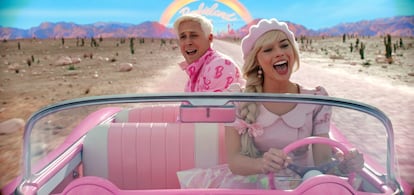Hollywood wants to embrace all religions
A former industry executive is promoting a course to teach film professionals how to treat religion in series and films in a plural, non-stereotypical way

In the movie Barbie, when the doll played by Margot Robbie reaches the sky of Mattel (that is, its executive floor), she runs into a display of patriarchy led by the CEO (Will Ferrell) who wants Barbie to return her to the bonds of her box. Faced with the hesitations of the main character, who is in the midst of an existential crisis after coming face to face with the values of a world that is alien to her pink paradise, he begins shouting at her: “Go back to your box, Jezebel!” The reference to the queen of Israel, who according to the Bible was thrown out of a window by her own servants for being despotic and libertine, an archetype of an impious harlot, reveals one of the many Judeo-Christian sub-readings in the blockbuster of the year.
In Oppenheimer, the father of the atomic bomb plays God, with all the moral dilemmas that his creation brings with it. In Everything Everywhere All at Once, Michelle Yeoh’s character has a revelation through a bagel that contains the entire universe and offers an answer to the drama of her useless life: “Nothing matters.” The multiverse of the latest Oscar winner is fueled by Taoist, Confucian and Buddhist references. We can find a theistic drive, a non-theistic drive, and everything in between in almost any film or series.
From the strict censorship of the Hays Code of the 1930s to the current ideological crisis, Hollywood (understood as the epicenter of entertainment culture) has exerted a powerful influence on our view of the world. Production companies today boast diversity, equity, and inclusion departments that work with more egalitarian criteria, both within the company and in the cultural products they generate. Perhaps the only facet left to come out of the closet is religion. To raise awareness about its representation, promote religious pluralism and a more empathetic view of spirituality on screen, DeeperDive was born, a course crafted at Harvard Divinity School aimed at screenwriters, content creators and media professionals.
Its promoter, Mario Cader-Frech, worked for 20 years at what is now known as Paramount Global, the conglomerate that owns Paramount Pictures, CBS, and MTV. As vice president of social responsibility, his task was to improve social impact messages in their content. “When I reached my retirement age, I realized that we had never touched on the topic of religion,” he says via Zoom. “In the U.S. there is an unwritten pact in the media to remain secular. However, that does not respond to reality, because spiritual ideology permeates everything.” His religious literacy project for Hollywood includes a strategy manual to approach it from the explicit to the subtext.
According to the most recent study by Pew Research, there are about 4,200 religions in the world, although more than 75% of the global population is divided between Christianity, Islam, Hinduism, and Buddhism. With the DeeperDive project, they want to dilute the barriers between them using cultural narratives and promote interreligious dialogue. “In Hollywood we continue to reflect models from 50 years ago: the same priest, rabbi or, unfortunately, the bad Muslim terrorist. I was part of the Gay and Lesbian Alliance Against Defamation, with which we combat homophobia in the media. Until 30 years ago, the image of gays was quite negative and sensationalist. Today, you ask a child what a gay person is like and they don’t give you a specific description. Our goal is that in 30 years you will ask a young person what a Christian, a Muslim, or a Jew is like and there will be no very specific definitions.”
Sign up for our weekly newsletter to get more English-language news coverage from EL PAÍS USA Edition
Tu suscripción se está usando en otro dispositivo
¿Quieres añadir otro usuario a tu suscripción?
Si continúas leyendo en este dispositivo, no se podrá leer en el otro.
FlechaTu suscripción se está usando en otro dispositivo y solo puedes acceder a EL PAÍS desde un dispositivo a la vez.
Si quieres compartir tu cuenta, cambia tu suscripción a la modalidad Premium, así podrás añadir otro usuario. Cada uno accederá con su propia cuenta de email, lo que os permitirá personalizar vuestra experiencia en EL PAÍS.
¿Tienes una suscripción de empresa? Accede aquí para contratar más cuentas.
En el caso de no saber quién está usando tu cuenta, te recomendamos cambiar tu contraseña aquí.
Si decides continuar compartiendo tu cuenta, este mensaje se mostrará en tu dispositivo y en el de la otra persona que está usando tu cuenta de forma indefinida, afectando a tu experiencia de lectura. Puedes consultar aquí los términos y condiciones de la suscripción digital.








































